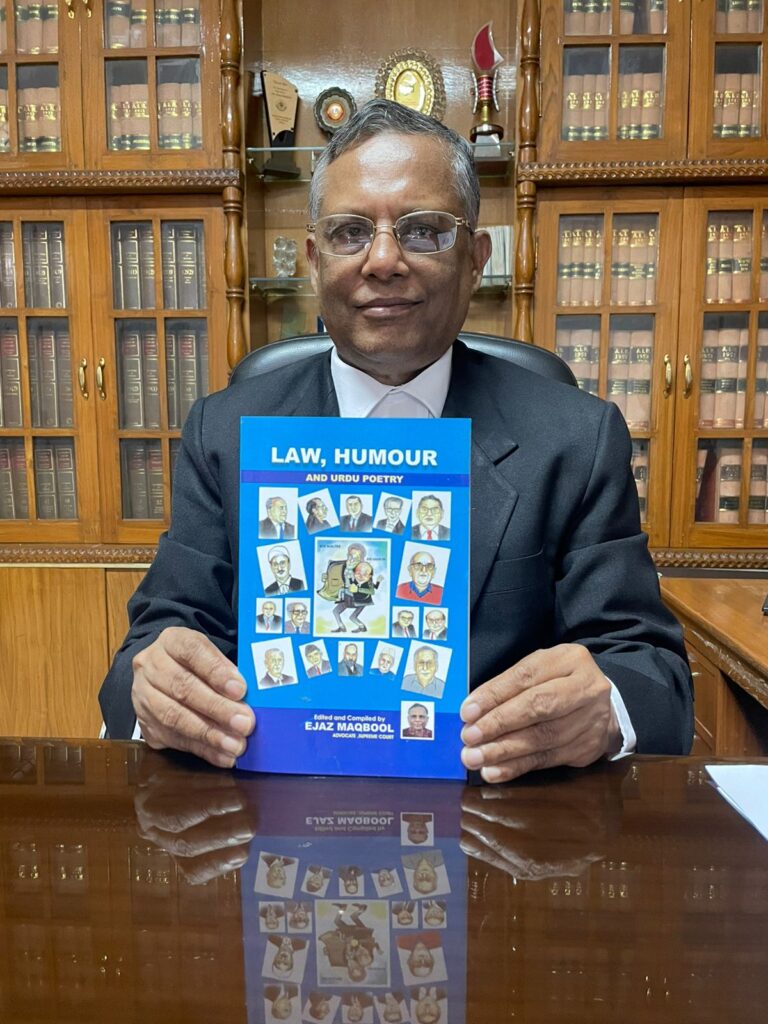NEW DELHI :

Advocate Eizaj Maqbool
“Khush kismat hain woh log jo Aligarh chhor dete hain; I was once told that leaving Aligarh was a stroke of luck,” says Eijaz Maqbool, a senior Delhi-based senior advocate as he reflects on the pivotal points in his life.
“It was a decision driven by a deep-seated desire to contribute meaningfully to society through the practice of law,” he told Awaz-the Voice. His tenure as the Vice-President of the Students’ Union at AMU was formative and one particular seminar which he organized left a lasting impression on him.
With his mother a teacher and father an assistant collector in customs, he reflects on the bare minimum salary that was just enough to sustain their family.
He left Aligarh with 20 recommendations and a dream no less than that of becoming the Prime Minister, Maqbool arrived in Delhi after having cycled for 138 kilometers.
Maqbool faced significant challenges in Delhi while trying to settle as a lawyer. “The reality of establishing myself in the legal fraternity struck hard,” he says. He found it challenging to find accommodation in Delhi for for prospective landlords held his being a Muslim, a law graduate, and hailing from Bihar, as his disqualifications as a tenant.

Advocate Eijaz Maqbool with his book
Undeterred, Maqbool found a mentor in Justice Tarkunde, who was already an established advocate in Delhi.
Maqbool started working for Rs 800 in Karanjawala, a law firm that is one of the major law firms in Delhi today. “In the Supreme Court, specialization does not exist as there’s no strict divide between civil and criminal cases and one handles all branches of law,” he explains. “We are jacks of all trades and masters of none,” he quotes.
Maqbool speaks about a few landmark cases in the legal history that he was associated with. “One of the pivotal cases in my career was the ‘Kihoto Hollohan’ or the ‘Aaya Ram Gaya Ram’ case,” he recalls, highlighting its constitutional significance in addressing political defections. Another watershed moment was his representation in the Babri Masjid dispute, where he advocated for the Muslim side – a role that garnered his media attention and scrutiny.
Beyond his legal achievements, Maqbool holds a passion for travel – he has visited 63 countries. He feels travelling not only enriches his experiences, it also informs his global perspective on legal matters. He says he plans his vacations well in time, before the Supreme Court vacations.
Interestingly, Eijaz Maqbool intends to write his travelogue scoring 100 countries.
On the challenges young lawyers face, Maqbool says that they face problems in securing mentorship and recognition. “The early years are pivotal,” he comments.
He admits that post-COVID, there is a decline in remunerations and placement for young lawyers, he advises greenhorns: “There is no substitute to hard work and as it is said, the genius is 1% intellect and 99% perspiration.” He asks young lawyers to work on networking, good command of the English language, and being technologically adept.
“The adoption of digital filings and virtual hearings by the Supreme Court has revolutionized legal practices,” he says and hopes it would percolate to the lower courts.
Maqbool is committed to mentoring the next generation of legal professionals and instilling in them a deep sense of integrity and commitment to justice. “My sons and my daughter-in-law have followed my footsteps,” he says proudly.
“Many of my juniors have flourished in their legal careers, which is immensely gratifying.” As he contemplates his legacy, Maqbool emphasizes the importance of upholding judicial independence and the rule of law.
“The judiciary must serve as a vigilant guardian against governmental overreach which is currently not the case”, he asserts.
The advocates often face ethical dilemmas in the need to draw a balance between working for the client’s best interest and upholding their responsibility as a law officer of the court by doing one’s best and leaving it to the court to decide in favour or against the case at hand. Maqbool quotes Urdu poet Akbar Allahabadi on this:
Paida hua waqeel toh shaitaan ne kaha,
Lo aaj ham bhi sahib-e-aulaad ho gaye’
(When a lawyer was born Satan said, “I have become a father today”)
During the COVID lockdown he studied the writings of about a hundred legal luminaries, dabbled in his love for Urdu poetry, and most importantly authored ‘Law, Humour, and Urdu Poetry’ that showcases his work as a advocate.”
A member of the Delhi High Bar Association, Supreme Court Bar Association, and International Bar Association, London, throughout his distinguished career, Advocate Maqbool has indeed touched the pinnacle of glory in his profession.
Starting as a law student in Delhi to establishing his boutique law firm in Noida, UP, his story reflects personal achievement and the profound impact of legal advocacy in shaping societies.
source: http://www.awazthevoice.in / Awaz, The Voice / Home> Story / by Rimsha, New Delhi / July 02nd, 2024








